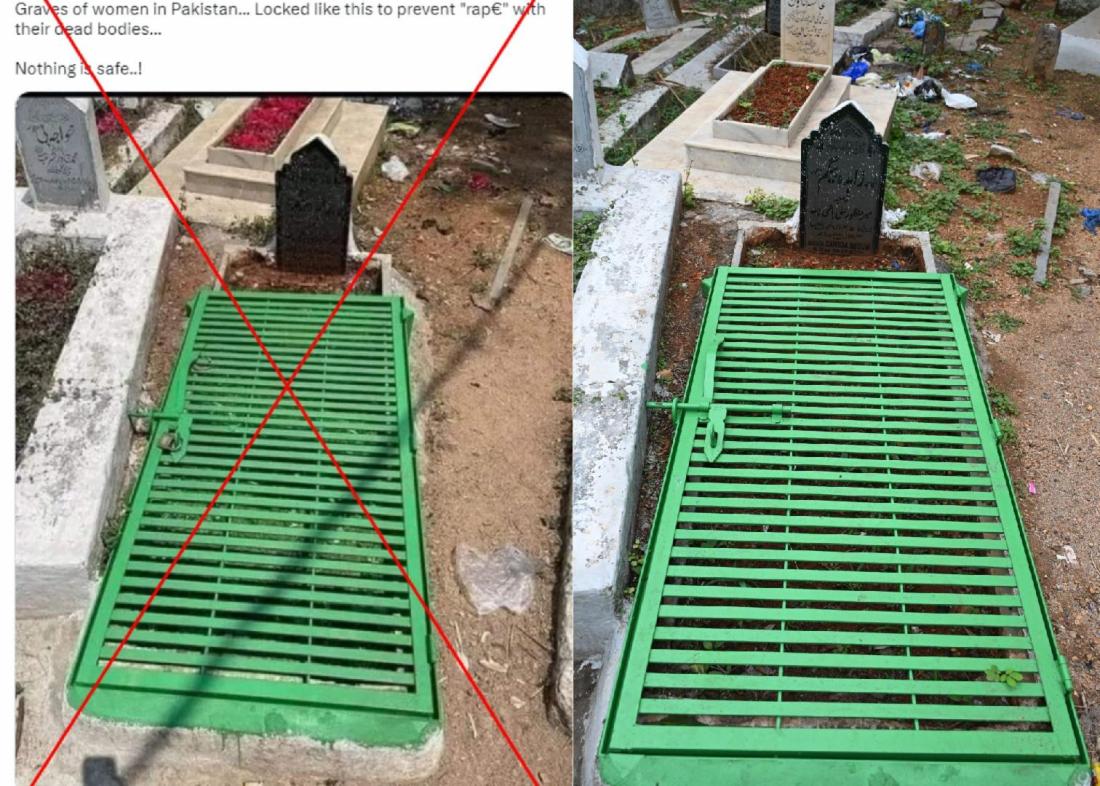
Locked grave photo from India falsely shared as Pakistan 'anti-rape gate'
- This article is more than two years old.
- Published on May 5, 2023 at 12:05
- 3 min read
- By Devesh MISHRA, AFP India
"Graves of women in Pakistan," reads a tweet posted on April 26.
"Locked like this to prevent "rap€" with their dead bodies...Nothing is safe..!"
The post, which has more than 3,000 retweets, shows a photo of a grave secured with a locked gate.

Australia-based Pakistani author Harris Sultan also shared the photo in a tweet saying that "people are now putting padlocks on the graves of their daughters to prevent them from getting raped" and condemning Pakistan's "sexually frustrated society".
He later deleted the tweet and shared a thread that explained the claim was incorrect -- but he noted that necrophilia cases have been reported in Pakistan (archived link).
Meanwhile, the Twitter account of Pakistan feminist activist Nishat Anjum went offline after she apparently shared the claim and was targeted by abuse after it was found to be false.
The misinformation also spread in India, where the photo was picked up by various news outlets falsely claiming it was taken in Pakistan, including the Times of India, Asian News International (ANI) and Hindi-language newspaper Amar Ujala.
Locked grave in India
A keyword search on Twitter found the photo posted by a social activist in India.
Mohammad Asif Khan, who says he documents cases of hate crime and Islamophobia, tweeted on April 30 that the grave was in Hyderabad in India, not Pakistan (archived link).
This graveyard is from Hyderabad, India.
— Md Asif Khan (@imMAK02) April 30, 2023
An Islamophobic atheist claimed that it was from Pakistan, and people locked it to save their daughters from rapists.
India's propaganda Media spread that fake news without verifying the fact.
Watch this video pic.twitter.com/Jdk3PhriI8
AFP geolocated the graveyard using Google Street View imagery from a mosque in Hyderabad called Masjid-e-Salar Mulk, which is opposite the site (archived link).
An AFP journalist in Hyderabad visited the cemetery on May 2 and took a photo of the grave.

Khan's tweet included a video of the mosque's muezzin Muqtar Sahab explaining that the gate had been put in place to prevent new remains being buried on top of the existing grave.
"This grave is about two years old and the only reason for locking it is that many people are going to bury dead bodies in old graves without asking," he says in Hindi.
He added that the family of the deceased had not sought permission from mosque authorities to install the gate, which is located by the main entrance to the cemetery.
The video shows the muezzin speaking to local social worker Abdul Jaleel, who told AFP his mother was buried in the same graveyard.
"Many times people bury another person on top of a grave and later when a person comes to remember his forefathers, they are disappointed not to find their grave there," he said.

Copyright © AFP 2017-2026. Any commercial use of this content requires a subscription. Click here to find out more.
Is there content that you would like AFP to fact-check? Get in touch.
Contact us
